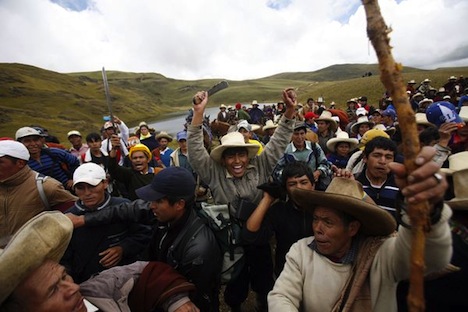Guest post by Jacob Bathanti
July 28 marked Peru’s day of national independence, the centerpiece of a series of celebrations collectively known as Fiestas Patrias. U.S. readers might imagine this extended holiday as a combination July 4, Thanksgiving, and Decoration Day (in its most tragic and most triumphant senses).![]()
It’s also the occasion for the sitting president to deliver a major policy address, more or less equivalent to the State of the Union. In this year’s speech, Peru’s president, Ollanta Humala, laid out an agenda which hit some nice notes, with the president focusing his attention on major themes of anti-corruption and social inclusion, with the latter to come both through social programs and through market-oriented growth.
There were few real details, and accordingly some commentators castigated the president for failing to concretely attend to major issues, such as citizen security, which are on many Peruvians’ minds. Still, Humala is on message: in none of his vagueness did he depart from the key pieces of his overarching double-barreled agenda: pursuing economic growth while ensuring that no one is left behind. Not a bit of what he said in his address was unexpected.
This all sounds innocuous enough, but the political context is more fraught than all that. Dealmaking among administration insiders and poorly handled attempts to rationalize the state bureaucracy have recently drawn very visible protests from young people, state employees, and the urban professional classes. And so it was that the most interesting part of Humala’s speech, as Rosario Yori has noted, came at the very end of the discourse. That’s when Humala implicitly conceded that not everyone is happy with his administration, or his plans for transforming Peru; when he acknowledged, however obliquely, that the road toward “La gran transformacion” will not be without twists and turns; when he conceded that he is aware that his program runs the risk of being derailed by its supposed beneficiaries:
…in seeming recognition of the crowds gathered in protest outside of Congress, Humala ended his speech with a message to Peruvians. “I urge you to maintain your vigilance and capacity for indignation to prevent corruption, injustice and discrimination. My promise is to work with you and listen to your demands.”
It is a move not uncharacteristic of a president who has rhetorically embraced themes of popular participation without delivering concrete measures to drive forward a participatory agenda. Even as Peru has seen an upsurge in in largely peaceful public demonstration, the Humala administration has asked demonstrators to ‘go home’; and even as municipalities have taken steps to push forward institutions of participatory democracy at the local level, the national administration stands accused of ignoring a pro-participation agenda at best, and of actively moving to neuter participatory institutions at worst.
This is problematic not merely from the standpoint of democracy theory. Peru’s conventional institutional framework is troubled, with weak and fragmented political parties, an unpopular Congress, and one of the least-trusted judiciaries in Latin America. I n this situation, Peru’s framework of participatory institutions – various arrangements that invite citizens to actively engage with political processes in a realm beyond simply voting and returning home to await the next electoral cycle – offers the best hope for a revitalization of the political scene. But the Peruvian government has shown itself unprepared to take participatory institutions seriously. This is a shame, because an injection of participatory democracy offers a chance to avert a crisis of governance, by fostering active citizenship to channel popular participation, and burgeoning discontent, in productive directions.
Below, I briefly lay out an institutional landscape in which local officials struggle with the implications of participatory democracy, and a landscape of contention in which protest movements are proliferating. I then offer some suggestions for deepening Peru’s participatory institutions, expanding the substantive exercise of citizenship in ways that move beyond protest. Continue reading Democracy, participation, and discontent: a crisis of governance for Peru?
